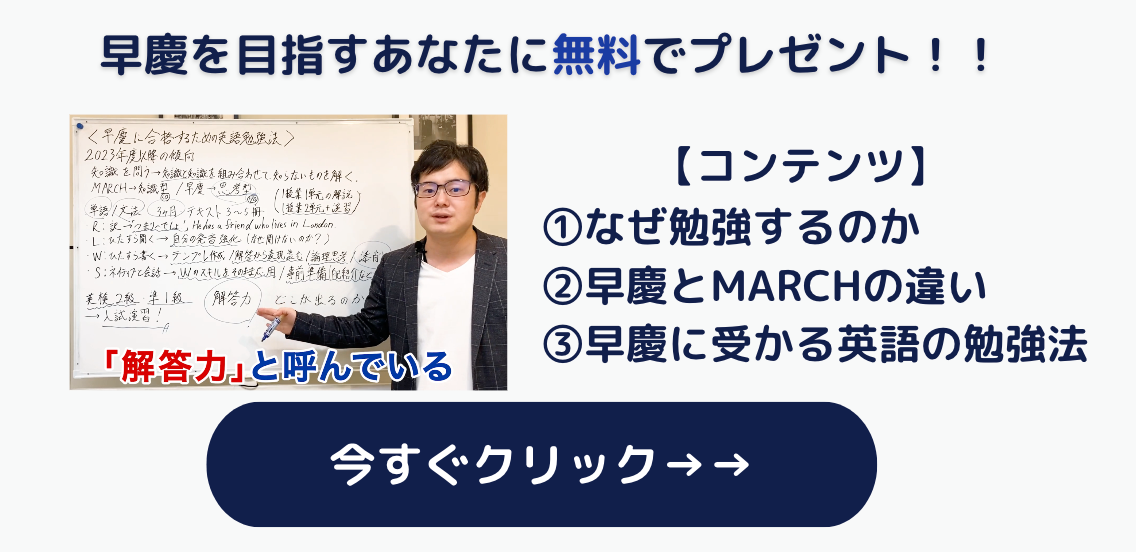Contents
- 従位接続詞
- ・because「理由は」
- ・, for〜「理由は〜」
- ・before「〜の前に」
- ・after「〜の後に」
- ・when「〜の時」
- ・while「〜している間に、一方で」
- ・if「もし」(未来のことを言うときはwillを使わず現在形)
- ・even if「たとえ〜でも」
- ・once「いったん〜すると」
- ・since「〜して以来、〜だから」
- ・unless「〜しない限り」
- ・till/until「〜までずっと」
- ・whereas「だが一方」
- ・although~/though~「〜だけれども」
- ・so that~「〜するために」/ so ~ that「〜なので」
- ・as~「〜するとき、〜なので、〜するにつれて」
- ・as if~「まるで〜のように」
- ・in case「〜だといけないから」
- 知っておきたい3つの形
- 命令形+and/or
- 従位接続詞と省略
- 時や条件を表す副詞節は未来のことも現在形で表す
従位接続詞
・because「理由は」
I want to be with you forever because you always encourage me.
私はあなたとずっと一緒にいたい。というのもあなたはいつも私を勇気づけてくれるから。
・, for〜「理由は〜」
We listened carefully, for he was serious.
私たちはしっかり聴いた。というのも彼が真剣だったから。.
・before「〜の前に」
You should go home before it starts rain.
雨が降り始める前に帰った方がいいですよ。
・after「〜の後に」
He looked happy after the party.
彼はパーティーの後幸せそうだった。
・when「〜の時」
When I was a child, I often played tennis.
私が子供の頃、よくテニスをしていた。
・while「〜している間に、一方で」
It was always raining while I stayed in Taiwan.
私が台湾にいる間、ずっと雨が降っていた。
Some can live a good life, while others can’t.
・if「もし」(未来のことを言うときはwillを使わず現在形)
Let’s go to the park if it is sunny.
もし晴れたら公園にいきましょう。
・even if「たとえ〜でも」
You must do it by yourself even if you are a child.
たとえあなたが子どもでも、それは自分でやらなければいけません。
・once「いったん〜すると」
Once we miss the bus in our town, the next one will come an hour later.
私たちの街で一旦バスを逃すと、次は1時間後まできません。
・since「〜して以来、〜だから」
I’ve lived in Meguro since I came to Japan.
私は日本に来てから目黒に住んでいます。
Since he is a student, it costs 1,000 yen to watch a movie.
彼は学生なので、映画を見るのに1,000円かかります。
・unless「〜しない限り」
Unless you go to school, you will not be a smart student.
学校に行かない限り、あなたは賢い学生にはなれません。
・till/until「〜までずっと」
You should wait here till I’m back.
私が帰ってくるまでここで待っていてください。
I’ll never give up until the referee blows the final whistle.
私はレフリーが最後の笛を吹くまで決して諦めない。
・whereas「だが一方」
You are not different from 10 years ago, whereas your classmates make progress.
あなたは10年前と何も変わっていない。だが一方クラスメイトは進歩している。
・although~/though~「〜だけれども」
Although his father is an American, he can’t speak English because he has lived in Japan since he was born.
彼の父はアメリカ人だけれども、彼は生まれた時から日本に住んでいるので英語は話せない。
・so that~「〜するために」/ so ~ that「〜なので」
She studies English very hard so that she can talk with people around the world.
彼女は世界中の人々と話せるようになるために英語をとても勉強している。
She studied English so hard that comes to be able to speak English.
彼女は英語をとても勉強したので、英語が話せるようになってきました。
・as~「〜するとき、〜なので、〜するにつれて」
As I came into the room, everyone stood up.
私が部屋に入ると、みんな立ち上がった。
As it takes two hours to go there, you should leave here now.
そこに行くのに2時間かかるので、すぐ区ここを出るべきです。
As children grow up, they get to do everything by themselves.
子供は成長するにつれてなんでも自分でするようになる。
・as if~「まるで〜のように」
The dog sleeps as if humans do so.
その犬はまるで人間のように寝る。
・in case「〜だといけないから」
I have a lot of emergency food in case a disaster occurs.
災害が起こるといけないので、多くの非常食を持っています。
知っておきたい3つの形
命令形+and/or
命令形にandを繋ぐと、「〜しなさい、そうすれば・・・」の意味になる
andには並置のニュアンスがあるので、前後が連続的に起こる様子を表す
You should leave home now, and you will catch the train.
すぐに家を出るべきです。そうすれば電車に乗ることができます。
命令形にorを繋ぐと、「〜しなさい、さもないと・・・」の意味になる
orには排他的なニュアンスがあるので、「〜か・・・のどちらか」という意味になる
You should leave home now, or you will miss the train.
すぐに家を出るべきです。さもないと電車を逃すでしょう。
従位接続詞と省略
・主語+be動詞の省略
While (I was) in Kyoto, I visited a lot of temples.
京都にいる間、私は多くの寺を訪れました。
When working on your assignment, you can send messages to your instructor.
宿題をやっている間、あなたは指導者にメッセージを送ることができます。
・it is/wasの省略
Hold for one minute if (it is) possible.
できれば1分だけ待ってほしいです。
・主語+一般動詞の省略
You have already done your homework, right? If not, you should do it now.
すでに宿題を終わらせましたね?そうでなければすぐにやるべきです。
時や条件を表す副詞節は未来のことも現在形で表す
・時や条件:時はwhen、条件はifなど
・副詞節:ここでは従属節のこと
・willなどを用いず、現在時制を使う
If I’m late, I will call you.
もし遅れたら、あなたに連絡するでしょう。

